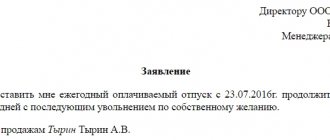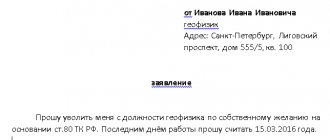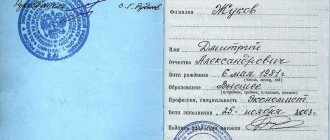The employer must be notified of voluntary resignation 14 days in advance. The countdown of time according to the Labor Code of the Russian Federation (Labor Code of the Russian Federation) starts from the next day when the manager accepted the application for consideration. An employee who has submitted an initiative request to resign may change this decision during service and refuse to resign without explaining the reasons for the decision. The employer is not entitled to leave without consideration a request to withdraw a resignation letter at his own request.
Permissible period for withdrawing a resignation letter at your own request
The reasons why an employee who has expressed a written desire to resign suddenly changes his mind and decides to withdraw the application can be different, including objectively justified ones, for example, the unexpected closure of a vacancy due to the employee’s premature return from maternity leave. The law does not limit the period in which an employee can notify of his intention to remain at work. He has the right to withdraw his application at any time.
In the practice of the courts, there have been cases when an employee was on sick leave on the last day of work and decided to refuse dismissal. The notice of refusal to resign was sent by telegram an hour after the end of the work shift in this organization. The employee was fired. But the court did not accept the arguments of the enterprise administration in defense of the correctness of the dismissal, stating that no notice of refusal to resign was received before the end of the working day. Official confirmation of the time of sending the telegram (before the expiration of the day of dismissal, and not working hours) served as the basis for a court decision in favor of the employee, with the motivation for committing a violation during dismissal.
The law does not define the moment at which the employment relationship ends. According to Art. 14 of the Labor Code of the Russian Federation they end on the next day after the calendar date determined by the parties as the last day of the employment contract.
The final day of work is determined based on the information specified in the application. There are two options for referring to the date that an employee considers to be the end of work, for example:
- Dismissed on May 3rd.
- Dismissed on May 3.
In both cases, the deadline for work is May 3.
The last working day is calculated similarly for an employee hired on a probationary period, no matter how many months.
When an agreement employee leaves before the service period, the period of recall notice is also reduced, and the final time of recall occurs on the last day, and not after two weeks.
If, after the period of service provided for by law, the employment agreement is not terminated, and the employee’s desire to continue the employment relationship has not changed again, the validity of the agreement remains valid.
How to win a dispute over the legality of salary deductions
The employer has the right to withhold part of the employee’s salary only in cases provided for by law (part one of Article 137 of the Labor Code of the Russian Federation). Let's look at some cases in detail.
– for unworked vacation days, when an employee is dismissed before the end of the working year for which he received annual leave. Exceptions - cases where an employee was fired due to staff reduction, liquidation of the company, etc. (part one of Article 77, part one of Article 81, part one of Article 83 of the Labor Code of the Russian Federation); - for compensation of unearned advances issued to an employee on account of his salary;
– to repay unspent and not returned timely advances issued in connection with a business trip or transfer to another job in another location, as well as in other cases; – to return amounts overpaid to the employee due to a calculation error and in the event of recognition by the labor dispute commission the employee’s guilt in failure to comply with labor standards or idle time (Articles 155, 157 of the Labor Code of the Russian Federation).
In all situations, except for deductions for unworked vacation days, the employer has the right to decide to reimburse the amount if two conditions are simultaneously met. Firstly, no more than a month has passed since the end of the period established for the return of the advance, repayment of debt or incorrectly calculated payments.
An employer can withhold overpaid wages from an employee in cases of a counting error, if the body for the consideration of individual labor disputes found the employee guilty of failure to comply with labor standards or idle time. And also if the salary was overpaid to the employee in connection with his unlawful actions established by the court (part four of Article 137, part three of Article 155, part three of Article 157 of the Labor Code of the Russian Federation).
Compensation by the employee for material damage. The employer has the right to recover from the salary of the guilty employee the amount of material damage caused to the organization in an amount not exceeding the average monthly salary. To do this, no later than a month from the day when the amount of damage was finally established, an order must be issued (part one of Article 248 of the Labor Code of the Russian Federation).
If the month period has expired or the employee does not agree to voluntarily compensate for the damage, and the amount recovered exceeds his average monthly earnings, the organization will be forced to go to court (part two of Article 248 of the Labor Code of the Russian Federation). In this case, it is important that the procedure for bringing the employee to financial liability is followed (Articles 246, 247, 248 of the Labor Code of the Russian Federation).
– taxes on personal income for which the employer is a tax agent (clause 1 of article 226 of the Tax Code of the Russian Federation); – trade union dues at the request of the employee (part five of article 377 of the Labor Code of the Russian Federation, clause 3 of article 28 of the Federal Law of 12 January 1996 No. 10-FZ); – additional insurance contributions for funded pension at the request of the employee (Part 2 of Art.
7 of the Federal Law of April 30, 2008 No. 56-FZ); – the amounts of benefits for temporary disability, maternity, child care, overpaid to the employee as a result of a calculation error or dishonesty on the part of the recipient (Part 4 of Art. 15 Federal Law of December 29, 2006 No. 255-FZ);
– deductions on the basis of a notarized agreement on the payment of alimony or a writ of execution (Article 109 of the RF IC); – overpaid amounts of state benefits to employees with children, if the overpayment occurred due to the fault of the recipient or as a result of a calculation error by the Federal Social Insurance Fund of Russia (Part 2 of Art. 19 of the Federal Law of May 19, 1995 No. 81-FZ); – deductions on the basis of an executive document (Article 98 of the Federal Law of October 2, 2007 No. 229-FZ).
Deductions from wages at the request of the employee. Sometimes an employee himself asks to withhold part of his salary, for example, to repay a loan. The laws do not clarify whether the employer has the right to do this. Rostrud expressed its position on this matter, explaining that the salary is not reduced by force, but at the request of the employee himself.
– serves correctional labor; – pays alimony for minor children; – compensates for harm caused to the health of another person; – compensates for harm to persons who suffered damage in connection with the death of the breadwinner; – compensates for damage caused by a crime.
– there are legal grounds for deductions from wages; – the amount of deductions did not exceed the limits established by law; – the deduction was made within the prescribed period; – the employee’s consent was obtained (if necessary).
In addition, court decisions depend on the basis on which part of the employee’s salary was withheld. Let's look at them in more detail.
Deductions due to a counting error. The law does not disclose the concept of “counting error”, but it has been developed by judicial practice. Often employers interpret it too broadly and lose cases because of this. The Supreme Court of the Russian Federation clarified that a counting error should be considered an error that was made in arithmetic operations, that is, related to counting (decision of the Supreme Court of the Russian Federation of January 20, 2012 No. 59-B11-17).
Employers win the dispute when there really were errors in the calculations. For example, when calculating the average salary in a mathematical operation, instead of multiplying, an accountant made a subtraction, which led to an excessive payment of money to the employee (appeal ruling of the Sverdlovsk Regional Court dated April 8, 2020 in case No. 33-4782/2015).
In cases where the employer made a technical error rather than a counting one, took into account the periods incorrectly, etc., correctly assess the prospects for the dispute. Employees loyal to the company often themselves report that money was transferred to them in excess and express their readiness to return the funds voluntarily.
Deductions for unworked vacation days. When an employee who has been granted vacation in advance quits, the question often arises about the return of vacation pay for days not worked. The employer has the right to withhold such amounts, but their amount cannot exceed 20 percent of the payments due to the employee upon dismissal (part two of Article 137, Article 138 of the Labor Code of the Russian Federation).
When the amount is not enough to pay off the entire debt, or the employee is not entitled to severance payments, the employer cannot withhold vacation pay for days not worked. The Supreme Court of the Russian Federation indicated that in such a situation, it is unlawful to collect the amount of debt from an employee in court, since the legislation does not contain grounds for this (Decision of the Supreme Court of the Russian Federation dated March 14, 2014 No. 19-KG13-18).
Retention of advance. The employer may decide to withhold an advance payment given to an employee in connection with a business trip, transfer to work in another location, and in other cases. This can be done if a month has not passed since the end of the period provided for the return of the advance and the employee does not dispute the basis and amount of deductions (part three of Article 137 of the Labor Code of the Russian Federation). If the employer complies with these legal requirements, then the employee will not subsequently be able to challenge the employer’s actions.
Conflicting practice has developed on the issue of collecting advance payments. Some courts believe that if an employer did not withhold part of the amounts paid when dismissing an employee, then it is unlawful to recover them in court (appeal ruling of the Krasnoyarsk Regional Court dated July 23, 2014 in case No. 33-7059/2014).
We invite you to familiarize yourself with: The procedure for dismissing a police officer
Other courts believe that the possibility of collecting an advance payment in court is provided for by part two of Article 137 of the Labor Code. The presence of dishonesty in the employee’s actions or a counting error is not necessary (appeal ruling of the Supreme Court of the Republic of Bashkortostan dated August 27, 2020 in case No. 33-14673/2015).
Important Takeaways
1. Part of the salary can be withheld in cases provided for by law.
Namely: to repay debts to the organization, compensation for material damage caused to the employer, as well as in other cases established by law. 2. As a general rule, the amount of deductions from wages should not exceed 20 percent, when withholding under several executive documents - 50 percent, and when collecting alimony for minor children, etc. - 70 percent. 3. The employer has an increased chance of winning a legal dispute if there are legal grounds for deductions from wages, they were made within the legal period, the amount does not exceed the established limits, and the employee’s consent has been obtained. Star for correct answer
Wrong
Right!
As a general rule, the amount of all deductions for each payment of wages to an employee cannot exceed:
50 percent;
30 percent;
20 per cent.
Procedure for withdrawing a resignation letter
When submitting an application to withdraw a resignation letter, it is preferable to use a sample of the internal document forms established in the organization. However, a standard template for an initiative resignation letter has not been established, and it can be withdrawn using various methods.
Record of cancellation on the application itself
You cannot simply take your refusal letter from the personnel officer and tear it up or cross it out. Alternatively, if it is considered acceptable in a given organization, it is allowed on the document itself, with the original intention of resigning, to make a handwritten note: “I request that the application be considered invalid,” with a signature and date. This option is possible for a small organization with a simple structure and little document flow.
Submitting a separate application
A more correct benefit in protecting the rights of personnel in the event of possible litigation is the fact of filing a separate written document with a request to invalidate the application submitted earlier.
Notifications by mail or telegraph
The Labor Code does not limit the withdrawal of a written request to resign by mail or telegram. The main thing is to be able to prove the following facts:
- the employer received information from the employee about the decision to withdraw the application;
- The initiative to revoke the dismissal document is taken by the employee himself, i.e. notification has been sent to them.
If the notice is sent by telegraph, then the telegram must be certified. To do this, a person must have a telegram form with him and sign it in the presence of the operator.
A registered letter will serve as proof of belonging to a specific sender of the postal message.
Warning about withdrawal of application by other means
The Labor Code of the Russian Federation also does not establish that the withdrawal of a notice of dismissal involves the signing of any document; a change in the decision to resign can be done orally. In the courts, oral forms of notifications are taken into account as evidentiary ones.
The following messages can be sent to the employer:
- By phone.
- During the reception.
- Remotely via the official email of the organization.
But to prove that the manager was warned of the intention to withdraw the submitted application for dismissal at his own request, it is necessary to obtain individual or combined evidence:
- testimony of witnesses;
- audio recording of a telephone conversation.
The court, after a comprehensive and objective examination of the circumstances of the case, considers such evidence to be sufficient.
An example from judicial practice
The employee verbally informed the director about the cancellation of the initiative application for dismissal and presented evidence to the court in the form of witness testimony and an audio recording of the conversation with the director. The court did not accept the employer’s representative’s arguments about the nullity of this type of notice, because the conversation took place during official hours, in the office and was of an official nature.
Notification by email
An electronic message to the official email of the organization is not excluded from the options for messages about the intention to change the decision to quit. The court considers it sufficient to confirm that an email belongs to a specific employee if it is sent from his registered email account.
Guarantee of acceptance of the review of dismissal for consideration
If there are any doubts about the compliance by the employer, its records management service or personnel service with the procedure for considering letters, and in order to exclude the intentional or accidental loss of a revoked application, it will be useful for the employee to do the following:
- Make sure to the organization's records management service that the submitted document is registered as incoming, and request that a note with the assigned number be made on its copy.
- Send your withdrawal application by registered mail.
The date of sending the registered letter is considered the day of filing the application.
What to do when the order has already been issued?
If the head of an enterprise (company) has already signed an official order to dismiss an employee, then the employer can cancel this official document only by a similar act. That is, filing one written application for a review in such a situation will no longer be enough.
In this situation, the HR department is preparing a new official order to cancel the previously issued one. In addition, a new entry is made in the employee’s employment record declaring the previous dismissal entry invalid.
The official procedure for the head of an enterprise (company) in such a situation is as follows:
- Cancellation of an order (instruction) on dismissal. For this purpose, a similar new document is being published.
- Cancellation of the previous entry in the labor record and leaving a new one with the following wording - “Entry No. is invalid.”
- Making certain amendments to the personal card of a resigning employee. In this document, the corresponding entry is crossed out and Fr.
- How to write and submit if you are an individual entrepreneur?
- What to do if the employer does not sign the document?
- What is a resolution on a resignation letter and how is it entered?
Registration by the personnel department of the withdrawal of the application for dismissal
When the personnel service of the organization receives an application or notice of withdrawal by an employee
of his request for dismissal, the specialist is obliged to follow the procedure for canceling this dismissal:
- endorse the revocation notice from the manager;
- on the old dismissal document, make a note about the cancellation and indicate the registration data of the withdrawn application.
Refusal to dismiss can no longer be cancelled, and the period of service will begin from the day the employee writes another application.
Cases in which a resignation letter cannot be withdrawn
A refusal to an employee who has changed his decision to quit is considered unacceptable if his place is offered to an employee of the same organization or a job applicant is invited from the labor market.
But there are 2 cases that do not give the employee the right to withdraw his resignation letter:
- An applicant from another employer is invited to take his place by transfer in writing.
- The employee takes a vacation, after which he quits.
The Labor Code of the Russian Federation establishes that it is impossible to withdraw a dismissal application when a written notice has been given to the employee for the planned vacancy by transfer from a third-party organization. For a month, the provisions stipulated by part 4, art. 64 of the Labor Code of the Russian Federation vetoes the refusal to formalize an employment agreement with this employee.
If the employee who was invited to transfer has not yet left his previous employer, then the manager has no reason to refuse the employee who has changed his desire to leave.
An example from judicial practice
The employee filed a petition for dismissal, which was withdrawn 8 days later. But on the day of submitting the application, an employee who cannot be refused by law is invited to transfer to this place, and a corresponding order was issued. According to Article 80 of the Code, a recall is unacceptable, but the court took into account that at that time the invited specialist was still working in his organization.
If a resigning employee goes on vacation with dismissal, then the opportunity to cancel his request to resign is available only before the vacation; once the vacation begins, it is no longer possible. The organization must issue a paycheck to the vacationer on the last working day before the vacation, at which time the position becomes vacant, and, accordingly, it is allowed to appoint another person to it on a permanent basis.
The dismissal of an employee who wrote an initiative petition for dismissal and decided to withdraw it when she learned of her pregnancy is also considered lawful. The court justifies the refusal of the claim by the fact that by this time the employer had given written consent to another employee who was dismissed by transfer from another company, which cannot be refused by law, and the Labor Code of the Russian Federation does not prohibit the dismissal of pregnant women on the initiative of an application.
In practice, it is also possible for a situation in which, after inviting an employee in the form of a transfer from another place of work, it turns out that it is not possible to employ him due to the requirements existing in the organization for applicants for this position. For example, it is mandatory to have permission to access documents or objects representing state secrets. In this case, the employee who withdraws the application is not dismissed.
Unusual situation with withdrawal of resignation letter
The case when an employee brings another application on time for work, with a later date for dismissal, is interpreted ambiguously. Some judges, as well as labor law experts, recognize the possibility of a person to revoke the initial dismissal document in this case when submitting another, considering that in fact, when writing the second application, the plaintiff expressed his will to refuse dismissal from the date indicated in the original document, which is a review.
Other judges refuse the employee, arguing that the second application must necessarily indicate the revocation of the first.
In such a situation, if the employee’s decision to quit remains unchanged, it is necessary to offer him:
- Submit a written petition withdrawing the first application for dismissal;
- write in the text of the second statement a phrase about the withdrawal of the first.
It is important that both parties are able to reach an agreement that avoids complaints or bringing the case to court. It would be correct if the employer or personnel officer, in a personal conversation or by telephone, tries to find out the circumstances of such behavior of the employee, clarify whether his intentions to quit are valid or some unforeseen situation has arisen, and, if possible, solve the problem.
Let's sum it up
Labor law issues are quite sensitive and affect the interests of both sides of the relationship. Despite the fact that labor legislation broadly covers all levels of these relations, there are nuances in the interpretation of certain provisions of the Code. Therefore, the main thing in any situation, especially related to the dismissal of an employee, is the desire for dialogue, through which a compromise is reached that satisfies both the employee and the employer.
Free consultation! Didn't find the answer to your question? Find out how to solve your particular problem - contact our lawyer in the online chat on the right, in the form below, or call our hotline:
This is important to know: Job reduction and transfer to another position










